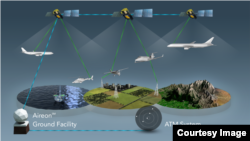About once a month, a group of Malaysians gather at a coffee shop or a home in Kuala Lumpur. They meet to support each other and to keep the memory of Malaysia Airlines flight MH370 alive.
Five years ago, the Malaysia Airlines plane disappeared on its way from Kuala Lumpur to Beijing. Search efforts covered an area from Southeast Asia to the coast of Africa. But neither the plane nor any of the 239 people it carried were found.
Investigators became hopeful when, in July 2015, a piece of the plane’s wing was found in the Indian Ocean east of Madagascar. But authorities officially suspended the search in January 2017.
Jacquita Gonzales’ husband, Patrick Gomes, was an inflight supervisor on the plane. Gonzales’ home is often the meeting place for family members of the missing.
“It goes beyond a group waiting for answers,” she told the Reuters news agency. “It has become a family as well, an extended family.”
Calvin Shim is raising his two children without his wife, Christine Tan. She was a crew member on flight MH370. “The other families know exactly how each of us feel,” he said at a recent meeting at Gonzales’ home.
New satellite tracking system
Since the 1940s, ground-based radar systems have been used to follow planes and other aircraft in flight. But this kind of system cannot track aircraft over large areas of the world’s oceans.
This is one reason why the Malaysia Airlines plane has not been found.
The disappearance of MH370 renewed the world’s attention on tracking aircraft around the world. Shortly after the disappearance, the International Civil Aviation Organization (ICAO) pushed for quick action “to improve tracking of aircraft in flight.”
The United Nations organization is now asking that aircraft be fitted with a tracking system that reports its position every 15 minutes. By 2021, the organization also wants aircraft to be able to send information once every minute when in trouble.
In April 2017, Malaysia Airlines announced that it would be one of the first airlines to use Aireon's space-based system to track its planes in flight. Aireon says its system uses 66 satellites to cover the world. Its system includes areas that lacked air traffic service in the past -- like over oceans and the North and South poles. The system uses Global Positioning System (GPS) and signals from aircraft to determine locations in real-time.
Aireon chief Don Thoma said in a statement: “Malaysia Airlines has taken a lead role in the industry since the tragic events of 2014. Real-time, global flight tracking, anywhere on the planet, will further its safety goals, by allowing Malaysia Airlines to track its aircraft anytime, anywhere.”
I'm Ashley Thompson.
Hai Do wrote this story for Learning English. Ashley Thompson was the editor.
________________________________________________________________
Words in This Story
wing - n. one of usually two long flat part of an airplane that extend from the sides and make it possible for that plane to fly
authorities - n. people who have power to make decisions
inflight - adj. provided while you are flying in an airplane
track - v. to follow or watch the path
tragic - adj. causing strong feelings of sadness







